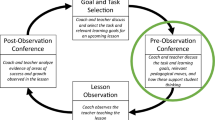Abstract
CAP, a Collaborative Analysis and Action Planning Process, is a consultation strategy developed to facilitate the improvement of teaching in higher education. The design is based on research from school ethnographies and instructional systems. CAP permits the complexities of the teaching process to be addressed and uses naturalistic inquiry methods in a consultation setting. Through the development of a collaborative relation with the instructor and students, their conscious and tacit knowledge can be combined with the consultant’s expertise to reach accurate data-based statements about the strengths, limitations, and achievable goals of the instructional process.
Similar content being viewed by others
References
Brown, R.Psycholinguistics: Selected papers. New York: The Free Press, 1970.
Cicourel, A. V. Basic and normative rules in negotiation of status and role. In D. Sudnow (Ed.),Studies in social interaction. New York: Free Press, 1972, 229–258.
Cooper, C. R.An ethnographic study of the dynamics of the instructional process in a college classroom. Unpublished doctoral dissertation, Michigan State University, 1979.
Cooper, C. R. Different ways of being a teacher: An ethnographic study of a college instructor’s academic and social roles in the classroom.Journal of Classroom Interactions, 1981,16 (2), 27–37.
Erickson, F. One function of proxemic shifts in face to face interactions. In A. Kendon, R. Harris, & M. R. Key (Eds.),The organization of behavior in face to face interaction. Chicago: Aldine, 1976.
Erickson, F. Some approaches to inquiry in school/community ethnography.Anthropology and Education Quarterly, 1977,8 (2), 58–69.
Florio, S.Learning how to go to school: An ethnography of interactions in a kindergarten/first grade classroom. Unpublished doctoral dissertation, Harvard Graduate School of Education, 1978.
Florio, S., & Walsh, M. The teacher as colleague in classroom research. In H. T. Trueba, G. P. Guthrie, & K. Hu-pei Au,Culture and the bilingual — bicultural classroom: Studies in classroom ethnography. Rowley, Mass: Newbury House, in press.
McDermott, R. P., Gospodinoff, K., & Aron, J.Criteria for an ethnographically adequate description of concerted activities and their contexts. Paper presented to the American Anthropological Association Meeting, Washington, D.C., December 1976; and at Conference on Epistemology for Practicing Behavioral Scientists, S.U.N.Y., Buffalo, N.Y., February 1977. Revised December 1977 for submission toSemiotica.
Mehan, H. Structuring school structure.Harvard Educational Review, 1978,48 (1), 32–64.
Moore, D. T.Social order in an alternative school. Doctoral Dissertation, Harvard University, 1977. Ann Arbor: Xerox University Microfilms, 77–30, 694.
Orban, Deborah,An ethnographic study of consultation to improve college teaching. Unpublished doctoral dissertation, Michigan State University, 1981.
Powdermaker, H.Stranger and friend: The way of an anthropologist. New York: W. W. Norton, 1966.
Sinclair, J., & Coulthard, R.Towards an analysis of discourse: The English used by teachers and pupils. England: Oxford University Press, 1975.
Smith-Bowen, E.Return to laughter. New York: Doubleday, 1964.
Wolcott, H.The man in the principal’s office. New York: Holt, Rinehart & Winston, 1973.
Author information
Authors and Affiliations
Additional information
CAP is a title given to this diagnostic consultation process by Dr. Deborah Orban, Asst. professor at the University of Texas. Dr. Orban further analyzed and described the CAP process for ther doctorial dissertation at Michigan State University, 1981.
Rights and permissions
About this article
Cite this article
Cooper, C.R. Getting inside the instructional process. Journal of Instructional Development 5, 2–10 (1982). https://doi.org/10.1007/BF02905490
Issue Date:
DOI: https://doi.org/10.1007/BF02905490




